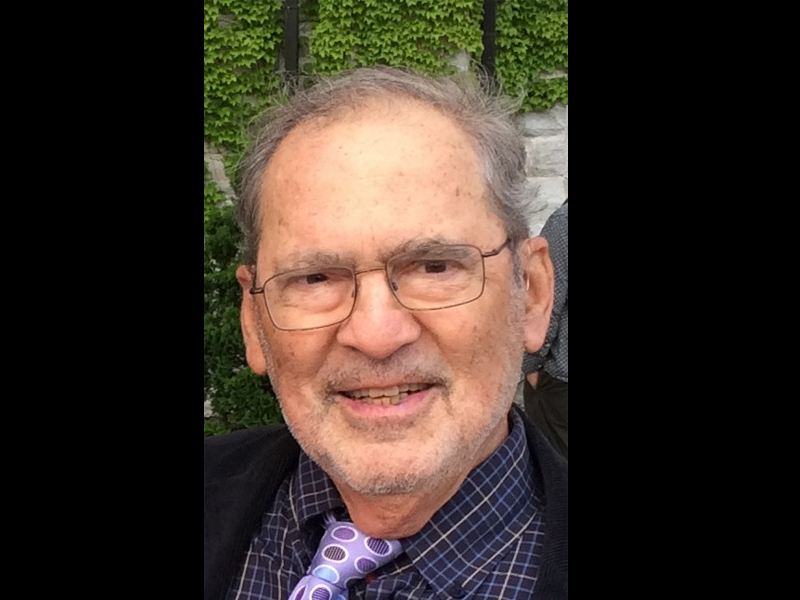Gerald Tulchinsky, a much-loved professor and prolific author who chronicled Canada’s Jewish history and its many colourful characters, died at his home in Kingston, Ont., on Dec. 13, after a lengthy bout with cancer. He was 84.
Tulchinsky began his professional career as a historian of Canadian business and labour, but later expanded his interests to include Canadian Jewish history.
His book, Taking Root: The Origins of the Canadian Jewish Community, which covers the period from 1762 to 1920, was published in 1992. A second volume, Branching Out: the Transformation of the Canadian Jewish Community, came out in 1998.
His other books included Canada’s Jews: A People’s Journey (2008); Joe Salsberg: A Life of Commitment (2013); and Shtetl on the Grand (2015), a collection of short stories.
His first volume, The River Barons: Montreal Businessmen and the Growth of Industry and Transportation, 1837-53, published in 1977, was based on his doctoral thesis, which was supervised by J.M.S. Careless, a giant of Canadian history. The work exposed Tulchinsky to the Canadian Jewish merchants who lived in Montreal at the time.
“He knew so much about his river barons,” the late University of Toronto historian Michael Bliss told a symposium a few years ago. In fact, Bliss said, Tulchinsky knew “far more” about the people involved in the commercial empire of the St. Lawrence than the most eminent historian of that era, Prof. Donald Creighton, ever did.
READ: TULCHINSKY’S HISTORY OF CANADA’S JEWS IS AN IMPRESSIVE WORK
Gerald Jacob Joseph Tulchinsky was born in Brantford, Ont., on Sept. 9, 1933, to Harry and Anne Tulchinsky. He was educated at the University of Toronto and McGill University.
He taught history to generations of students at Queen’s University from 1966 until 2000 and was director of the university’s Jewish studies program after he retired from the history department.
He wrote and edited dozens of articles on business, transportation, immigration and anti-Semitism.
“If one were to look up mensch, one would find Jerry’s photograph,” remarked fellow historian Frank Bialystok. “Above all, Jerry was generous, unpretentious, supportive and opinionated. He was a wonderful and inspiring teacher to students, colleagues and audiences.”
Bialystok, who has also written extensively on Canadian Jewish history, called Tulchinsky “the foremost scholar of Canada’s Jews. His writing on Zionism, business, labour and the military are the standard from which his successors take their cues.”
Tulchinsky was searching for photographs for his latest work, a history of the Canadian clothing industry, the day before he died, Bialystok added. “We may never see the likes of him again.”
If one were to look up mensch, one would find Jerry’s photograph.
– Frank Bialystok
Ira Robinson, professor of Judaic studies at Concordia University in Montreal, said Tulchinsky will be remembered as a major scholar “who successfully fostered the transition between the study of Canadian Jewry as a subject largely of interest within the Jewish community, to a topic of academic importance and relevance within Canadian universities.
“His synthesis of Canadian Jewish history remains the standard by which any other interpretation of that history will be measured.”
University of Toronto sociologist Robert Brym, a leading scholar of Jewish trends, said Tulchinsky was “the dean of Canadian Jewish historians. His work laid the foundation for future research on the history of Canadian Jewry and will be recognized as such for many generations.”
Historian Erna Paris echoed similar sentiments. She considers Tulchinsky “among Canada’s foremost scholars of Canadian Jewish history. His loss to the community is a substantial one, but I am confident that his books and articles will continue to enlighten Canadian readers for years to come.”
Morton Weinfeld, a sociology professor at McGill University, said Tulchinsky’s work was “outstanding” because he blended two perspectives: “He was a historian who understood that Jewish life in Canada was a result of the intersection of the Jewish experience and the Canadian context. He knew both. He had an eye for details that could illustrate broad themes. He was a superb scholar and colleague.”
Michael Marrus of the University of Toronto knew Tulchinsky as “a fair-minded, gentle scholar” and “a devoted teacher and colleague,” while William Shaffir, a sociologist who has also studied Canadian Jewish trends, said Tulchinsky was “the foremost academic of Canadian Jewry. A prolific scholar, his work laid the foundation for anyone interested in Jews in Canada. His research was meticulous and opened the door for making studies of Canadian Jewry reputable beyond the Jewish community.”
Tulchinsky was “a mensch – a virtuous, honourable man, a good teacher concerned for his students and the leading scholar of Canadian Jewish history,” said his longtime friend, historian Jack Granatstein.
Sometimes, Tulchinsky bucked accepted wisdom, as when he argued that Jews did not serve in the Second World War out of proportion to their numbers, as had often been claimed. In one of his books, Tulchinsky wrote that during the war, “only” 39 per cent of Jewish men of military age served in the Canadian Armed Forces, compared to 41 per cent of all eligible men. Overall numbers, he suggested, did not support a Jewish military tradition in Canada.
Tulchinsky is survived by his wife of 56 years (Ruth), three children (Steve, Ellen and Laura), two grandchildren, a brother (Ted) and a sister (Norma Sautman).
